中考英语专题《介词》教学案(附练习答案解析)
人教版中考英语专题复习学案:介词、连词(含答案)
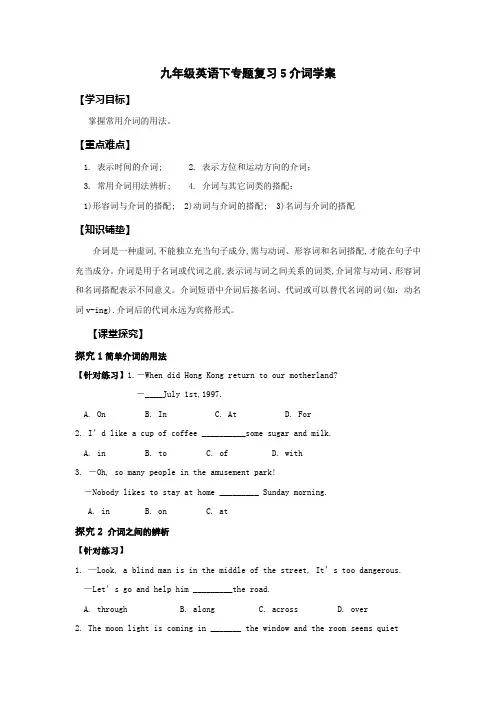
九年级英语下专题复习5介词学案【学习目标】掌握常用介词的用法。
【重点难点】1. 表示时间的介词;2. 表示方位和运动方向的介词;3. 常用介词用法辨析;4. 介词与其它词类的搭配:1)形容词与介词的搭配; 2)动词与介词的搭配; 3)名词与介词的搭配【知识铺垫】介词是一种虚词,不能独立充当句子成分,需与动词、形容词和名词搭配,才能在句子中充当成分。
介词是用于名词或代词之前,表示词与词之间关系的词类,介词常与动词、形容词和名词搭配表示不同意义。
介词短语中介词后接名词、代词或可以替代名词的词(如:动名词v-ing).介词后的代词永远为宾格形式。
【课堂探究】探究1简单介词的用法【针对练习】1.-When did Hong Kong return to our motherland?-____July 1st,1997.A. OnB. InC. AtD. For2. I’d like a cup of coffee __________some sugar and milk.A. inB. toC. ofD. with3. -Oh, so many people in the amusement park!-Nobody likes to stay at home _________ Sunday morning.A. inB. onC. at探究2 介词之间的辨析【针对练习】1. —Look, a blind man is in the middle of the street, It’s too d angerous. —Let’s go and help him _________the road.A. throughB. alongC. acrossD. over2. The moon light is coming in _______ the window and the room seems quietand beautiful.A. acrossB. throughC. over3. Be careful when you come _________ the street, because the traffic is very busy at the moment.A. acrossB. behindC. betweenD. over探究3 考查成语介词与介词固定搭配【针对练习】1. You must always be careful _______ electricity. It’s dangerous.A. toB. atC. forD. with2. Boys and girls, wish you to do well in the English exam ______ a light heart. Good luck to every-one!A. onB. withC. without【达标练习】1. I met my good friend my way to school.A. byB. inC. atD. on2. It’s very kind you to help me with my English.A. forB. inC. ofD. with3. There is a little boy the apple tree. He wants to pick the apples it.A. in; onB. on; inC. in; inD. on; on4. Have you found the answer this question?A. ofB. toC. forD. with5. Mr. Li usually goes to school______ bike, sometimes foot.A. in; onB. by; withC. on; byD. by; on6. Can you tell me the story________ English?A. withB. forC. inD. on7. —How are you going to meet your friend at the airport Saturday morning? —I’m going there my car.A. for; inB. on; inC. on; onD. in; on8. China is famous its long history.A. inB. asC. forD. with9. — I think drink plenty of water is good_______ our health.— Yes, I agree you.A. for; withB. to; toC. with; toD. at; with10. After class, I like playing computer games and chatting my friends _____ the Internet.A. to; byB. with; onC. for; inD. about; through11. A new bridge will be build the river next year.A. overB. onC. inD. above12. Everyone is here Lin Tao. He has gone to Beijing.A. exceptB. besidesC. withoutD. but13. There are two windows the wall.A. onB. inC. aboutD. over14. Before 2003, there was no direct airline _______Taiwan and mainland.A. alongB. inC. betweenD. at15. a player, I’m looking forward the 2012 Olympic Games.A. For; atB. As; toC. With; forD. Of; to【学后反思】_________________________________________________________________参考答案:1-5 DCABD 6-10 CBCAB 11-15 AABCB九年级英语下专题复习6连词学案【学习目标】1. 掌握并列连词and, but, or, so等的主要用法;2. 熟练运用常用的从属连词的基本用法。
2024年人教版中考英语复习介词专项教案
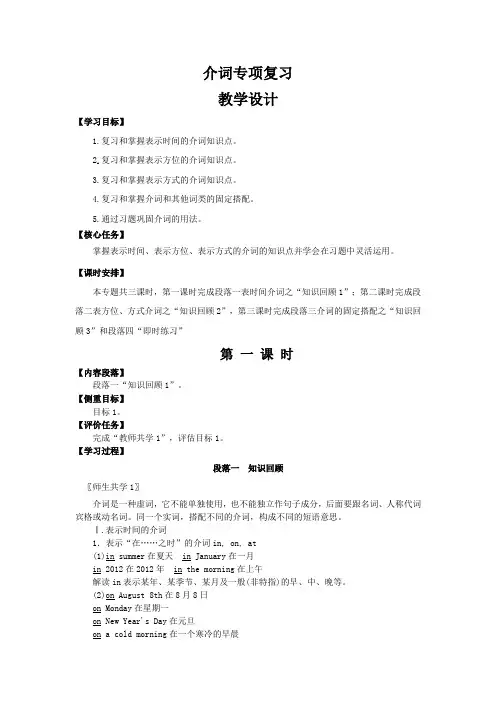
介词专项复习教学设计【学习目标】1.复习和掌握表示时间的介词知识点。
2.复习和掌握表示方位的介词知识点。
3.复习和掌握表示方式的介词知识点。
4.复习和掌握介词和其他词类的固定搭配。
5.通过习题巩固介词的用法。
【核心任务】掌握表示时间、表示方位、表示方式的介词的知识点并学会在习题中灵活运用。
【课时安排】本专题共三课时,第一课时完成段落一表时间介词之“知识回顾1”;第二课时完成段落二表方位、方式介词之“知识回顾2”,第三课时完成段落三介词的固定搭配之“知识回顾3”和段落四“即时练习”第一课时【内容段落】段落一“知识回顾1”。
【侧重目标】目标1。
【评价任务】完成“教师共学1”,评估目标1。
【学习过程】段落一知识回顾〖师生共学1〗介词是一种虚词,它不能单独使用,也不能独立作句子成分,后面要跟名词、人称代词宾格或动名词。
同一个实词,搭配不同的介词,构成不同的短语意思。
Ⅰ.表示时间的介词1.表示“在……之时”的介词in, on, at(1)in summer在夏天in January在一月in 2012在2012年in the morning在上午解读in表示某年、某季节、某月及一般(非特指)的早、中、晚等。
(2)on August 8th在8月8日on Monday在星期一on New Year's Day在元旦on a cold morning在一个寒冷的早晨on Sunday afternoon在周日下午解读on表示具体某一天及某一天的早、中、晚。
(3)at 5:10在5点10分at the end of在……的末尾at night在晚上at this time此时此刻解读at表示某一时刻或比较短暂的时间。
I went to Hangzhou last Sunday.我在上周日去了杭州。
解读在this,that,last,next,every等词之前不能直接加介词。
2.时间介词in, after(1)He came back after three days.三天后他回来了。
中考介词英语教案
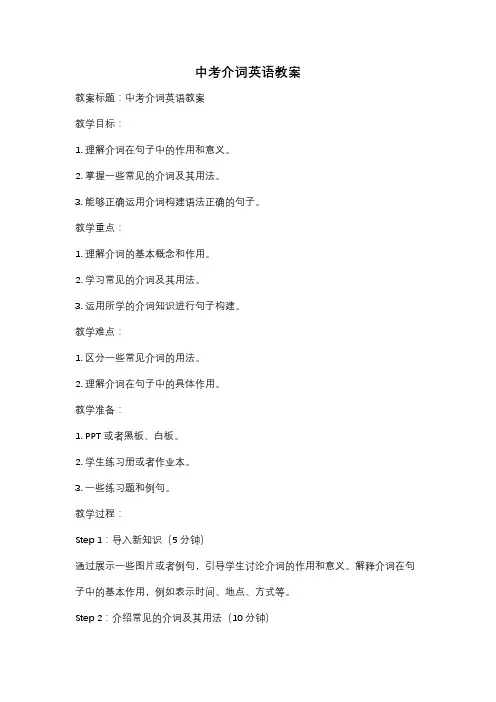
中考介词英语教案教案标题:中考介词英语教案教学目标:1. 理解介词在句子中的作用和意义。
2. 掌握一些常见的介词及其用法。
3. 能够正确运用介词构建语法正确的句子。
教学重点:1. 理解介词的基本概念和作用。
2. 学习常见的介词及其用法。
3. 运用所学的介词知识进行句子构建。
教学难点:1. 区分一些常见介词的用法。
2. 理解介词在句子中的具体作用。
教学准备:1. PPT或者黑板、白板。
2. 学生练习册或者作业本。
3. 一些练习题和例句。
教学过程:Step 1:导入新知识(5分钟)通过展示一些图片或者例句,引导学生讨论介词的作用和意义。
解释介词在句子中的基本作用,例如表示时间、地点、方式等。
Step 2:介绍常见的介词及其用法(10分钟)通过PPT或者黑板、白板,介绍一些常见的介词及其用法。
例如介词in表示在某个地方,on表示在某个表面上,at表示在某个具体的地点等。
解释每个介词的用法,并给出一些例句。
Step 3:练习介词的用法(15分钟)给学生发放一些练习题,让他们根据所学的介词知识填空或者完成句子。
教师可以在黑板上展示答案,帮助学生纠正错误并解释正确答案的用法。
Step 4:巩固与拓展(15分钟)让学生以小组为单位进行对话练习,要求他们在对话中使用所学的介词。
教师可以在小组之间进行交流,鼓励学生积极运用介词。
Step 5:总结归纳(5分钟)让学生总结所学的介词知识,可以通过填写一个表格或者写一篇小结来进行总结归纳。
Step 6:作业布置(5分钟)布置一些作业,例如完成练习册上的相关练习或者写一篇关于介词的作文。
鼓励学生在作业中运用所学的介词知识。
教学反思:通过本节课的教学,学生能够理解介词的作用和意义,掌握一些常见的介词及其用法,并能够正确运用介词构建语法正确的句子。
教师在教学过程中要注重启发学生思考,激发他们的学习兴趣,并及时纠正他们的错误。
同时,为了提高教学效果,可以通过多种形式的练习和互动来巩固学生的学习成果。
初中中考介词教案
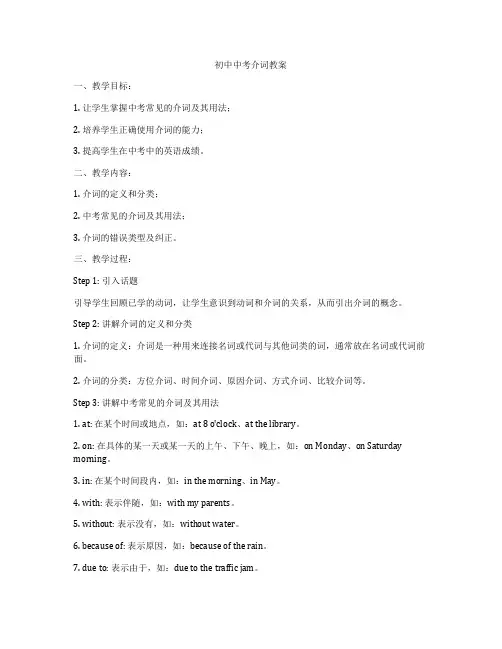
初中中考介词教案一、教学目标:1. 让学生掌握中考常见的介词及其用法;2. 培养学生正确使用介词的能力;3. 提高学生在中考中的英语成绩。
二、教学内容:1. 介词的定义和分类;2. 中考常见的介词及其用法;3. 介词的错误类型及纠正。
三、教学过程:Step 1: 引入话题引导学生回顾已学的动词,让学生意识到动词和介词的关系,从而引出介词的概念。
Step 2: 讲解介词的定义和分类1. 介词的定义:介词是一种用来连接名词或代词与其他词类的词,通常放在名词或代词前面。
2. 介词的分类:方位介词、时间介词、原因介词、方式介词、比较介词等。
Step 3: 讲解中考常见的介词及其用法1. at: 在某个时间或地点,如:at 8 o'clock、at the library。
2. on: 在具体的某一天或某一天的上午、下午、晚上,如:on Monday、on Saturday morning。
3. in: 在某个时间段内,如:in the morning、in May。
4. with: 表示伴随,如:with my parents。
5. without: 表示没有,如:without water。
6. because of: 表示原因,如:because of the rain。
7. due to: 表示由于,如:due to the traffic jam。
8. by: 表示方式或手段,如:by bus、by working hard。
9. like: 表示相似,如:She looks like her mother。
10. than: 表示比较,如:He is taller than me。
Step 4: 介词的错误类型及纠正1. 错误类型:介词的遗漏、介词的误用、介词的位置错误等。
2. 纠正方法:加强对介词的认知,多进行练习,注意语境的理解。
Step 5: 课堂练习设计一些练习题,让学生运用所学知识进行练习,巩固所学内容。
(英语)中考英语介词专题训练答案及解析
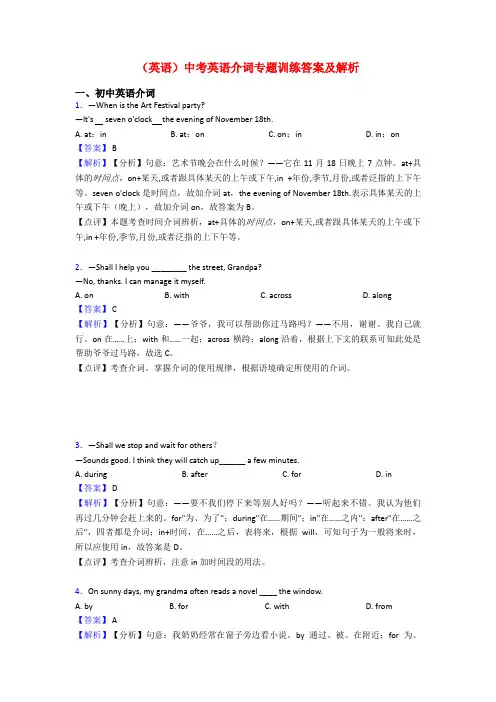
(英语)中考英语介词专题训练答案及解析一、初中英语介词1.—When is the Art Festival party?—It's seven o'clock the evening of November 18th.A. at;inB. at;onC. on;inD. in;on【答案】 B【解析】【分析】句意:艺术节晚会在什么时候?——它在11月18日晚上7点钟。
at+具体的时间点,on+某天,或者跟具体某天的上午或下午,in +年份,季节,月份,或者泛指的上下午等。
seven o'clock是时间点,故加介词at,the evening of November 18th.表示具体某天的上午或下午(晚上),故加介词on,故答案为B。
【点评】本题考查时间介词辨析,at+具体的时间点,on+某天,或者跟具体某天的上午或下午,in +年份,季节,月份,或者泛指的上下午等。
2.—Shall I help you ________ the street, Grandpa?—No, thanks. I can manage it myself.A. onB. withC. acrossD. along【答案】 C【解析】【分析】句意:——爷爷,我可以帮助你过马路吗?——不用,谢谢。
我自己就行。
on在……上;with和……一起;across 横跨;along沿着,根据上下文的联系可知此处是帮助爷爷过马路,故选C。
【点评】考查介词。
掌握介词的使用规律,根据语境确定所使用的介词。
3.—Shall we stop and wait for others?—Sounds good. I think they will catch up______ a few minutes.A. duringB. afterC. forD. in【答案】 D【解析】【分析】句意:——要不我们停下来等别人好吗?——听起来不错。
(完整word版)中考介词专题讲解及练习
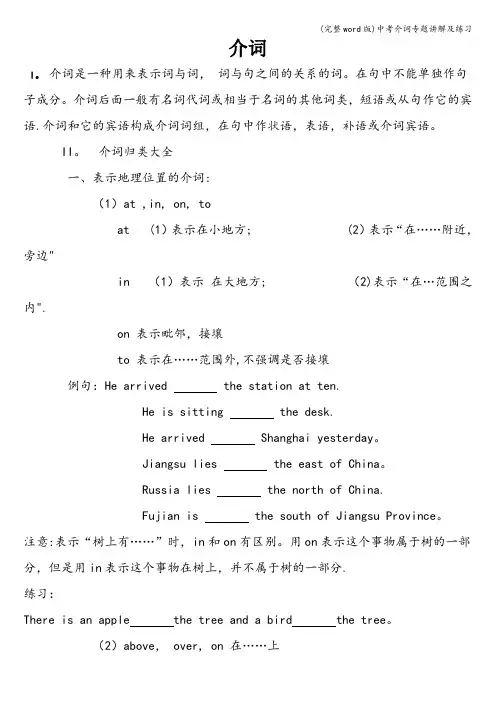
介词I。
介词是一种用来表示词与词,词与句之间的关系的词。
在句中不能单独作句子成分。
介词后面一般有名词代词或相当于名词的其他词类,短语或从句作它的宾语.介词和它的宾语构成介词词组,在句中作状语,表语,补语或介词宾语。
II。
介词归类大全一、表示地理位置的介词:(1)at ,in, on, toat (1)表示在小地方; (2)表示“在……附近,旁边"in (1)表示在大地方; (2)表示“在…范围之内".on 表示毗邻,接壤to 表示在……范围外,不强调是否接壤例句:He arrived the station at ten.He is sitting the desk.He arrived Shanghai yesterday。
Jiangsu lies the east of China。
Russia lies the north of China.Fujian is the south of Jiangsu Province。
注意:表示“树上有……”时,in和on有区别。
用on表示这个事物属于树的一部分,但是用in表示这个事物在树上,并不属于树的一部分.练习:There is an apple the tree and a bird the tree。
(2)above, over, on 在……上above 指在……上方,不强调是否垂直,与 below相对;over指垂直的上方,与under相对,但over与物体有一定的空间,不直接接触。
on表示某物体上面并与之接触。
例句:The bird is flying my head。
There is a bridge the river。
He put his watch the desk。
(3)below, under 在……下面under表示在…正下方below表示在……下,不一定在正下方例句 There is a cat the table。
初三英语总复习介词经典教案
辅导教案专题七介词讲义课前热身ually we don't realize how important nature is to us______ it is too late.A. unlessB. untilC. ifD. after2.Go to bed early,______ you won't get up on time next morning.A.then B.and C.but D.or3.He met many problems ____ he was going over his lessons .A. beforeB. as soon asC. sinceD. While4.My brother is going to look for another job______the company offers him more money. A. after B.when C unless D.besides5.English is interesting, _____ I didn't like it at first.A. andB. soC. butD. Or一、初中英语常用介词的基本用法根据介词的意义分类A.表示时间的介词1.at表示时间点用at,ight等;表示不确定的时间或短期假日也用at,如at that time, at Christmas等。
2.on指某天用on, 如on Monday, on the end of November, 指某天的朝夕用on,如on Friday morning, on the t等。
3.in指长于或短于一天的时段用in,如in the afternoon, in February, in Summer, in 1999等。
4.介词by表示…的时候、到、等到…已经等用在天、时间的前面。
如:by 2 o‘clock5.介词after + 一段时间用于一般过去时。
人教版中考英语专题复习教案:介词
九年级英语下专题复习介词教案【教学目标】要求学生掌握常用介词的用法。
【教学重点难点】1. 表示时间的介词;2. 表示方位和运动方向的介词;3. 常用介词用法辨析;4. 介词与其它词类的搭配;1)形容词与介词的搭配; 2)动词与介词的搭配; 3)名词与介词的搭配。
【知识梳理】一、考查简单介词的用法[知识链接]1.at、in、on表示时间的区别(1)at表示具体的时间点,常用于表示钟点及某些词组中。
如:at Christmas(在圣诞节);at six o’clock(在6点钟);at night(在晚上);at the end of(在……结束时);at the age of(在……岁时);at last(最终,最后)。
(2)in还可以表示从现在算起到若干时间以后,意为“在……时间后”,用于一般将来时或过去将来时态。
如:Can you finish drawing a good horse in five minutes?你能在5分钟内画一匹好看的马吗?(3)on用于表示确定的时间,具体某一天或具体某一天的上午、下午、晚上或一般节日等。
如:on December 1st,1994 (在1994年12月1日);on Teachers’ Day (在教师节)on Monday morning (在星期一上午);on a cold morning (在一个寒冷的早晨);on the night of October 22nd (在10月22日晚上);on Christmas Day (在圣诞节)。
注意:在以this,that,next,last,tomorrow,yesterday等开始的表示时间的单词或词组前不用介词。
如:I will go to Beijing next week.下周我将去北京。
2.for,since,from表示时间的区别(1)“for+一段时间”意为“已经多长时间了”,强调某动作或状态持续了多长时间,可与过去、现在、将来等多种时态连用,谓语动词只能用延续性动词。
中考英语专题复习介词教学案
介词课题名称专题复习:介词复习课三维目标 1. 复习和掌握简单介词,复合介词。
2. 复习和掌握介词短语。
重点目标1、难点目标1导入示标介词是一种虚词,不能单独充当句子成分,它可以和后面的名词、代词或相当于名词的其他词、短语或从句构成介词短语。
目标三导学做思一:同学们你们知道表示时间的常用介词有哪些吗?导学:1.in; on; at用在时间词前,表“在”1)at + 具体时刻2)on + 具体某天(具体某天的上、下午等;星期词;以及上、下午词前有修饰词时)3)in + 年、月、季节及一天中的某部分导做:注意:at night= in the night at noonat this / that time at Christmaseg. 1.___ the morning 2.___ Monday mor ning3. ___ a rainy evening4. ___3:505.__ 20026.___ the morning of April 107.___ spring8.___ night 9.___ this ti me 10. ___ March导思:注意:在时间词(morning , afternoon , evening ; Sunday…)前有last, next , this , that时,不再用介词. tomorrow, tonight前也不用介词。
eg. I will go(A) to the cinema(B) in(C) this evening. ______________学做思二:你知道表示地点和方位的常用介词有哪些吗?导学:in , on , at 表地点:at一般指小地方;in一般指大地方或某个范围之内;on往往表示“在某个物体的表面”。
in , on , to表方位in(范围内);on(范围外且接壤);to(范围外但不接壤)。
可表示为下图的位置关系导做:1)He arrived ___Shanghai yesterda y.2)They arrived ___a small village before dark.3)There is a big hole ____ the wall.4)The teacher put up a picture ____ the wall.5)Taiwan is the southeast of China.6)Hubei is the north of Hunan.7)Japan is the east of China.导思:你能说出介词in,on,at分别可以表示什么吗?学做思三:你还知道并会运用其他的一些介词吗?导学导做:cross: 动词“跨过,越过”=go across4. across: (表面)跨过through: (内部)穿过,贯穿介词eg. 1)Can you swim _____ the river?2)The road runs __________ the f orest.3) _____ the bridge, you’ll find a c inema.5. in + 时间段:与将来时连用after + 时间段:与过去时连用但after + 时间点:可与将来时连用。
人教版中考英语专题复习《介词专题》教案
人教版中考英语专题复习《介词专题》教案一. 教材分析人教版中考英语专题复习《介词专题》教案以我国现行的人教版初中英语教材为基础,结合中考英语考试大纲,精选了各类介词的典型试题进行讲解和训练。
本教案旨在帮助学生系统地复习和掌握介词的用法,提高他们的英语应用能力。
二. 学情分析1.学生已经掌握了部分介词的基本用法,但对其在具体语境中的运用还不够熟练。
2.学生对介词的辨析能力较弱,容易混淆。
3.学生对介词的搭配和固定短语了解不多。
4.学生在实际运用介词时,常常出现错误,如使用不当、遗漏等。
三. 教学目标1.知识目标:使学生掌握各类介词的基本用法,提高他们在具体语境中的运用能力。
2.能力目标:提高学生对介词的辨析能力,增强他们的英语应用能力。
3.情感目标:激发学生学习英语的兴趣,培养他们积极向上的学习态度。
四. 教学重难点1.重点:介词的用法和搭配。
2.难点:介词辨析和固定短语的运用。
五. 教学方法1.任务型教学法:通过完成各种任务,激发学生的学习兴趣,提高他们的实践能力。
2.情境教学法:创设真实的语境,让学生在实践中学会使用介词。
3.合作学习法:鼓励学生互相讨论、交流,共同提高。
六. 教学准备1.教学课件:制作介词专项复习课件,包含各类介词的用法、例句和练习。
2.练习题:准备各类介词的练习题,包括选择题、填空题、翻译题等。
3.教学素材:收集一些与介词相关的文章、图片等素材,用于拓展学生的知识视野。
七. 教学过程1.导入(5分钟)利用图片、歌曲等素材,引导学生复习已学的介词,激发他们的学习兴趣。
2.呈现(10分钟)通过课件,概括介绍各类介词的用法,让学生对介词有一个整体的认识。
3.操练(15分钟)让学生分组进行练习,完成选择题、填空题等题目,巩固对介词用法的掌握。
4.巩固(10分钟)学生互相交流练习心得,教师点评并讲解疑难问题。
5.拓展(10分钟)引导学生学习介词的固定搭配和用法,通过例句和练习,提高他们的实际运用能力。
- 1、下载文档前请自行甄别文档内容的完整性,平台不提供额外的编辑、内容补充、找答案等附加服务。
- 2、"仅部分预览"的文档,不可在线预览部分如存在完整性等问题,可反馈申请退款(可完整预览的文档不适用该条件!)。
- 3、如文档侵犯您的权益,请联系客服反馈,我们会尽快为您处理(人工客服工作时间:9:00-18:30)。
中考专题六介词【教学目标】知识和技能:1、熟悉并记忆中考词汇表的搭配和本课的重点搭配与短语。
2、会正确使用常用的介词。
过程和方法:1、通过检测的形式,了解学生掌握情况。
2、通过大量针对性与补充练习,操练本课短语和搭配。
情感态度和价值观培养学生对待事物的耐心和细致【教学重点】:1、常用、疑难短语的辨析3、语境内容的判断【教学难点】:介词短语的使用.【知识梳理】介词的定义及语法功能一.介词的定义:介词又叫前置词,是一种虚词。
介词分为三种,一种是简单介词,如at, in, on, beside, to , for等;另一种是短语介词,即由两个以上的词组组成的短语,如in front of, because of, out of, instead of等;还有一种叫二重介词,如until after, from behind等。
二.介词的句法功能:介词不能独立在句中做成份,介词后必须与名词、代词、或动名词构成介词短语在句中充当一个成份,表示人、物、事件等与其它人、物、事件等之间的关系。
1、作定语:The book on the table is mine.2、作状语:We have breakfast at seven.(表时间);They were late for meeting because of the heavy rain.(表原因);They started the machine by pressing the button.(表方法)3、作表语:My dictionary is in the bag.4、作宾语补足语:I found him in the office.三.介词的分类1above在…前, about在…附近, across在…对面, after在…后面,…近旁, among在…中间, around在…周围, round在….周围, at 在…处, before在...前, behind在...后, below低于..., beside在...旁边, between在...之间, by 在...旁, down在...下面, from来自..., in在...里面, inside在...里面, near靠近..., of在...之中, on在...上面, out of在...之外, outside在....外面, over在....上方, under在...下方, up在...上面, on top of在...顶部, in front of在...前, close to靠近..., in the middle of在...的中间, at the end of在...的末端,等等。
across横越..., against对抗..., along沿着..., around绕着..., round环向…后面, b etween…and…从…到...,by路过/通过..., down向…下,for向..., from从/离..., in进入..., into进入..., inside到...里面, near接近..., off脱离/除..., on 向...上, out of向...外, outside向....外, over跨过..., past经过/超过..., through穿过..., to向/朝..., towards朝着..., on to到...上面, onto到...上面, up向...上, away from远离...about大约..., after在…以后, at在…(时刻), before在…以前, by到…为止,期间, for有…(之久), from从…(时)起, in在(上/下午);在(多久)以后, on在(某日), past过了…(时), since自从…(至今), through 贯穿…(期间), till直到…时, until直到…时, to到(下一时刻), ever since从那时起至今,at the beginning of在...开始时,at the end of 在...末, in the middle of在...当中,at the time of在...时as作为/当作..., by用/由/乘坐/被..., in用…(语言), like与…一样, on骑(车)/(收音机/电视机), over通过(收音机), through通过..., with用(材料),用(手/脚/耳/眼), without没有…关于..., except除了…, besides除了…还... for对于/就…而言, in在…(方,有关..., on关于/有关..., to对…而言, towards针对..., with就…而言其它介词:【目的介词】for为了..., from防止…,to为了…【原因介词】for因为..., with由于…, because of因为...【比较介词】as与…一样,like象…一样,than比...,to与…相比, unlike与…不同【伴随/状态介词】against和…一起(比赛),at在(上班/休息/上学/家,etc.),in穿着…(衣服/颜色),into变成...,on在(值日), with与…一起,有/带着/长着..., without没有/无/不与…一起2重要注释:⑴this / that / these / those / last / next / a / every / each等词构成的时间短语,前面不用任何介词。
如:Every year travellers from abroad come to visit Pingyao.He had a bad cold that week.⑵for有时用来引出动词不定式的逻辑主语,常翻译成“对于…而言”。
如:It’s too hard for me to finish the work in only one hour.The house is big enough for 10 men to live in.⑶of有时用来表示后面的人物正好是前面的表语的逻辑主语。
如:I t’s very nice/kind of you to do so.(你这么做真是太好了)⑷介词有时会与它的宾语分离,而且宾语前置。
①当宾语是疑问词时。
Who are you talking about?(你们在谈论谁?)②宾语在从句中当连接词时。
He has a younger brother who he must take good care of.Do you know who our teacher is talking with over there?③动词不定式作定语且该动词为不及物动词,后面有介词。
I finally found a chair to sit on.【典型例题】:2013年上海市中考1.Wow! Ten students in our class will celebrate their fourteenth birthdays _____ October!A. inB. onC. atD. to2.The chemicals in the vegetables and fruit are bad our health.A. fromB. withC. ofD. for2014年上海市中考3.Students are encouraged to share their learning experience their classmates.A. toB. inC. atD. with【思维训练】(一) 改正下列句子中使用错误的介词1、We got to the top of the mountain in daybreak.2、Don't sleep at daytime.1、We visited the old man in Sunday afternoon.4、He became a writer at his twenties.5、He went to New York to find a job in sixteen years old.6、We went to swim in the river in a very hot day.7、I'm looking forward to seeing you on Christmas.8、I haven't see you during the summer holidays.9、At entering the classroom, I heard the good news.10、In the beginning of the book, there are some interesting stories.11、Till the end of next week. I will have finished this work.12、He came to London before last weekend.13、I have studied English for three years since I had come here.14、I can help you repair this bike. You will get it after two hours.15、Three days after he died.16、She hid herself after the tree.17、There is a beautiful bird on the tree.18、Shanghai is on the east of China.19、I arrived at New York on July 2nd.20、He lived in No. 3 Beijing Road.21、There is a colour TV set at the corner of the hall.22、This weekend I'll stay in Uncle Wang's.23、Do you know there is some good news on today's newspaper?24、The school will begin on September 1st.25、In my way to the station, I bought a newspaper to kill time.26、Look, the door is open, Maybe someone broke into.27,I'll leave Beijing to Shanghai tomorrow.28、I'm sorry. I have to get out the bus at next stop.(二)选择题1. - Thank you ___the beautiful flowers!- Not at all.A. inB. onC. atD. for2. Can you answer this question ___English?A. byB. inC. withD. from3. Look ___the map ___China ___the wall, please.A after, of, inB at, of, in C. after, in, on D. at, of, on4. - When did Mr Green arrive in London?- He arrived there ___the evening of December 6th.A. atB. inC. onD. to5. We won the relay race. And there was a big smile ___our teacher's face.A. offB. nearC. onD. between6. The twins got on well ___their classmates.A. toB. inC. withD. about7. - Please remember to come to my birthday party.- I see. I'll come ___Saturday evening.A. inB. atC. onD. for8. Let's hurry,or we'll be late ___school.A.toB.atC.withD.for9.They will have a maths test ___two days.A.forB.atC.inD.after10. My brother joined the army ___.A.1989,MarchB.in March,1989C.March,1989D.1989,in March11 He couldn't work out the maths problem ___your help.A.withoutB.underC.forD.with12 Granny took one look at us ___her glasses.A.byB.throughC.onD.in13. We had our breakfast ___a quarter ___seven.A./,toB.in,toC.at,toD.on,to14.I learn French ___the radio every day.A.onB.inC.fromD.at15. It's good manners to wait ___line.A.inB.onC.atD.with16 How many English words had you learnt ___last term?A.by the end ofB.at the end ofC.to the end ofD.till the end of17. The manager was very satisfied ___his work.A.inB.onC.aboutD.with18. John hit Jack ___face.A.on theB.in theC.on hisD.in his19.I was born ___the night ___September 15,1978.A.in,onB.at,onC.at,inD.on,of20.It's a bad manner to laugh ___people when they are ___trouble.A.over,inB.at,inC.in,atD.at,for21 I can't do this work well ___Tom's help.A.underB.forC.withoutD.from22. Don't shout ___the old woman.You should be more polite ___her.A.to,atB.at,toC.in,forD.from,for23. We must be strict ___our selves ___everything.A.with,inB.in,withC.with,toD.to,of24. He went to the football match ___lunch last Sunday.A.toB.withoutC.behindD.between25. The people's Republic of China was founded ___1949.A.withB.onC.sinceD.in26. Mr Black got to Hangzhou ___a few days.A.inB.afterC.onD.at27. - Has the teacher given you any advice ___your English study?- Yes,he has.A.fromB.withC.onD.in28. You may depend ___him.He is ___honest man.A.on,aB.in,anC.on,anD.at,the29. ___my joy,I can answer this question.A.WithB.ToC.ByD.For30. The teacher asked the students to look ___the word in the dictionary.A.forB.atC.upD.after31. A little monkey is playing ___a tree and there are a lot of bananas ___itA.on,onB.in,onC.on,inD.in,in32. I go to school ___bus every morning.A. inB. byC. onD. at33. No one likes a person ___bad manners.A. withoutB. onC. out ofD. with34. The policeman was surprised ___the news.A. intoB. forC. atD. out of35. He had to sell newspapers ___seven.A. at an age ofB. at the ages ofC. at the age ofD. at age of【挑战自我】1. This skirt is made ________ your mother ________ her own measure.A. for; toB. for; forC. to; toD. for; by2. Instead of calling ________ his uncle, he called ________ my new house with his wife that day.A. by; forB. on; atC. for; onD. at; by3. Kate’s little brother kicked the ball to the river; she took great trouble to get it ________ the river.A. onB. fromC. from onD. over from4. The pretty girl is known ________ the public ________ a little film star ________ her excellent performance in a film.A. in; as; withB. to; as; forC. among; with; inD. by; for; because of5. It’s really hot ________ January in Har bin now. Better take off your coat.A. inB. duringC. forD. to6. —They all agree ________ George. Has the project been passed?—Who ________ George can make the final decision?A.except; exceptB.except; besideC.but; butD. besides; but7. So far, several ships have been reported missing ________ the coast of Bermuda.A. offB. alongC. onD. around8. —I like coffee with nothing in it. What about you?—I prefer coffee ________ sugar.A. toB. forC. withD. than9. —I’m going to cut the big tree down? —What ________ ?A. byB. toC. withD. at10. Britain has recently had a high level of unemployment—but the same is true ________ many other countries.A. atB. fromC. ofD. to11. ________ her hair getting gray, she has decided to have it dyed.A. AsB. ForC. WithD. Though12. —These boxes are too heavy for me to move.—Here, I’ll give you a hand ________ them.A. forB. toC. withD. by13. —Do you have ________ difficulty working out the problem?—Yes. It is ________ me.A. no; easy forB. some; withinC. any; withinD. any; beyond14. Mr Black was driving fast to take his wife to a nearby hospital because their baby was ________.A. on its wayB. in the wayC. by the wayD. out of the way15. There is no greater love than ________ who devotes his whole life ________ mankind.A. that of a man; to benefitingB. a man; to benefitingC. that of a man’s; benefitsD. a man’s love; in benefiting16. —I wonder what’s on television this evening. Have you got a newspaper?—Yes, ________ TV programmes are ________ the back page.A. the; onB. the; inC. / ; inD. / ; on17. Most people in that area objected with little effect ________ a golf playground there.A. to buildB. of buildingC. to have builtD. to building18. Food prices increased ________ 10% in less than a year.A. forB. toC. byD. at19. Areas where students have particular difficulty have been treated ________ particular care.A. byB. withC. asD. in20. The study you have been making ________ the ancient Chinese characters is an instructive job.A. toB. forC. ofD. from21. —Have you read the book War and Peace ________ Tolstoy?—No. I’ve never heard of it.A. forB. byC. withD. to22. ________ the rapid growth of short messages sent by mobile phones, the increasing number of criminal cases appeared through short messages.A. ForB. ByC. AsD. With23. Mr Smith sold that magnificent cottage of his on the sea ________ 2,000,000 dollars.A. atB. forC. toD. by24. The customer bargained with the shopkeeper for a long time, and finally they agreed ________ the price.A. toB. withC. onD. at25. I am anxious about what notes he made in the back of his diary ________ things to mend or replace.A. byB. inC. withD. of26. I don’t think it’s fair to judge a person ________ their clothes.A. inB. fromC. withD. on27. Books are the most important records we keep ________ man’s thoughts, ideas and feelings.A. upB. ofC. forD. on28. In the experiment we kept a watchful eye ________ the developments and recorded every detail.A. inB. atC. forD. on29. I’ve k ept up a friendship with a girl whom I was at school ________ twenty years ago.A. tillB. withC. aboutD. since30. The woman sold the eggs ________ seven dollars and they were sold ________ half price.A. with, atB. for, atC. at, inD. by, on典型例题ADD一、介词集训基础题(一) 找出错误的介词答案(一)1、[误]We got to the top of the mountain in daybreak.[正]We got to the top of the mountain at day break.[析]at用于具体时刻之前,如:sunrise, midday, noon, sunset, midnight, night。
